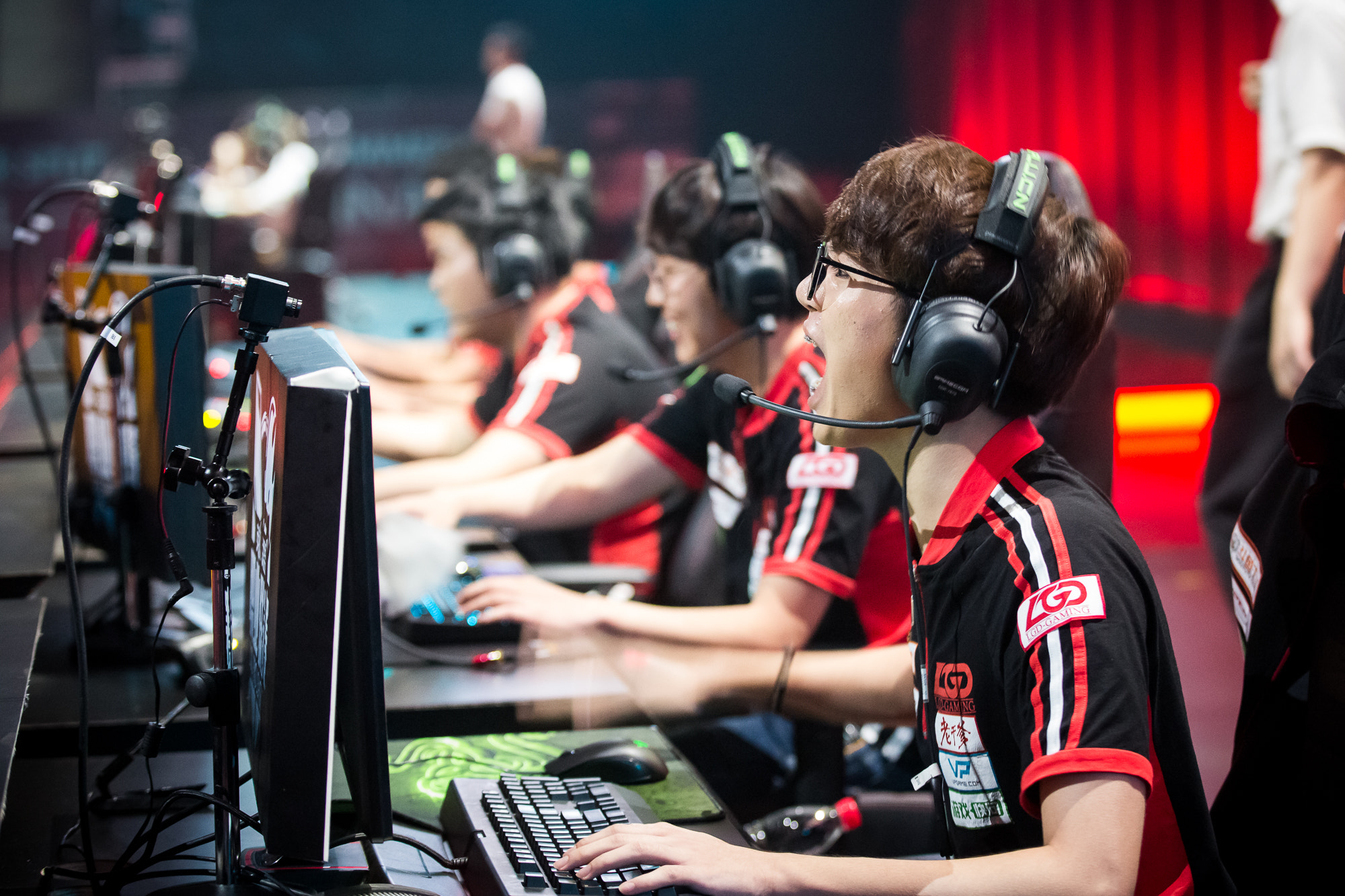
Esports
Esports (/ˈiːspɔːrts/ ⓘ), short for electronic sports, is a form of competition using video games.[1] Esports often takes the form of organized, multiplayer video game competitions, particularly between professional players, played individually or as teams.[2]
This article is about video game competitions. For simulated sports in video games, see Sports game. For multiplayer games in general, see Multiplayer video game.
Multiplayer competitions were long a part of video game culture, but were largely between amateurs until the late 2000s, when the advent of online streaming media platforms, particularly YouTube and Twitch, enabled a surge in participation by professional gamers and spectators.[3][4] By the 2010s, esports was a major part of the video game industry, with many game developers designing for and funding for tournaments and other events.
Esports first became popular in East Asia, particularly in China and South Korea (which first licensed professional players in 2000) but less so in Japan, whose broad anti-gambling laws prohibit professional gaming tournaments.[5][6] Esports are also popular in Europe and the Americas, which host regional and international events.
The most common video game genres associated with esports are multiplayer online battle arena (MOBA), first-person shooter (FPS), fighting games, card, battle royales, and real-time strategy (RTS) games. Popular esports franchises include League of Legends, Dota, Counter-Strike, Valorant, Overwatch, Street Fighter, Super Smash Bros. and StarCraft. Among the most popular tournaments are the League of Legends World Championship, Dota 2's International, the fighting game-specific Evolution Championship Series (EVO) and Intel Extreme Masters. Many other competitions use a series of league play with sponsored teams, such as the Overwatch League. Although the legitimacy of esports as a true sporting competition remains in question, they have been featured alongside traditional sports in some multinational events in Asia. The International Olympic Committee has discussed their inclusion in future Olympic events.
In the early 2010s, viewership was about 85% male and 15% female, with most viewers between the ages of 18 and 34.[7][8][9] By the late 2010s, it was estimated that by 2020, the total audience of esports would grow to 454 million viewers, with revenue increasing to more than US$1 billion, with China accounting for 35% of the global esports revenue.[10][11]
Players and teams
General Players and Teams
Professional gamers are often associated with esports teams or broader gaming and entertainment organizations. Teams such as FaZe Clan, Cloud9, Fnatic, T1, G2 Esports, and Natus Vincere have become successful within esports and now sponsor esports players around the world.[156][157] These teams often cover multiple esports games within tournaments and leagues, with various team makeups for each game. They may also represent single players for one-on-one esports games like fighting games within Evolution Championship Series, or Hearthstone tournaments. In addition to prize money from tournament wins, players in these teams and associations may also be paid a separate team salary. Team sponsorship may cover tournament travel expenses or gaming hardware. Prominent esports sponsors include companies such as Logitech and Razer.[158] Teams feature these sponsors on their website, team jerseys and on their social media, in 2016 the biggest teams have social media followings of over a million.[159] Associations include the Korean e-Sports Association (KeSPA), the International e-Sports Federation (IeSF), the British esports Association, and the World esports Association (WESA).
Some traditional sporting athletes have invested in esports, such as Rick Fox's ownership of Echo Fox,[160] Jeremy Lin's ownership of Team VGJ,[161] and Shaquille O'Neal's investment in NRG Esports.[162] Some association football teams, such as FC Schalke 04 in Germany,[163] Paris Saint-Germain esports in France;[164] Besiktas JK, Fenerbahce S.K., and Galatasaray in Turkey; Panathinaikos F.C. in Greece either sponsor or have complete ownership in esports teams.[165]
Competitive Esports tournaments in the most popular games pay hundreds to thousands of dollars to players for winning tournaments.[166] Dota 2's 2021 tournament The International had a prize pool over $40 million and is projected to keep growing. Counter-Strike: Global Offensive had a 2021 prize pool of around $22 million.[167] However, financial security in the industry is largely limited to players in top performing teams. One study found that only 1 in 5 professional gamers have careers that last longer than two years.[168] Team rosters are extremely volatile, sometimes changing players or rosters within a season.[169]
While different from the regimens of traditional sports, esports athletes still have extensive training routines. Team Liquid, a professional League of Legends team, practice for a minimum of 50 hours per week and most play the game far more.[170] In April 2020, researchers from the Queensland University of Technology found that some of the top esports players showed similar aspects of mental toughness as Olympic athletes.[171][172] This training schedule for players has resulted in many of them retiring an early age. Players are generally in competition by their mid- to late-teens, with most retiring by their late-20s.[173]
Unique Players and Teams
There is a long history of different esports teams or certain players in leagues that aren't exactly the same as most players. For example, there are many esports organizations or teams that are entirely made up of players that have physical disabilities. Permastunned and ParaEsports are great examples of this where ParaEsports is completely composed of professional CSGO players that have cerebral palsy. Whilst these teams aren't in many cases very successful in the major leagues of their respective esports, there are certain leagues or tournaments that are restricted to only have teams or players like these be able to compete. Although these teams or tournaments don't get nearly as much attention, budget, or prize pool as the main leagues of popular esports, it is still important to recognize these amazing players that have overcome their unfortunate positions and strive to succeed.